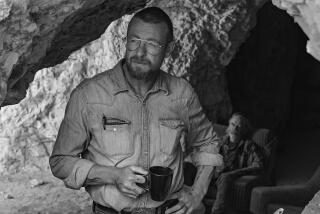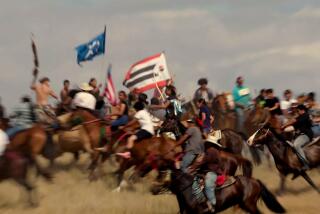‘Chant of Jimmie Blacksmith’ Echoes With Tragedy
- Share via
In Australia at the turn of the century, a young aborigine went mad after a life of racial injustice. He butchered a white family, setting off a manhunt through the bush that lasted five months. The press of the day feasted, turning the chase into a daily serial that captured readers.
The story eventually took on the status of Aussie folklore, a tale that seemed to grow bloodier and more profound with successive generations. Novelist Thomas Keneally, now a professor at UC Irvine, turned it into a book, and director Fred Schepisi made it a movie in 1978. “The Chant of Jimmie Blacksmith” screens Friday night as the second installment in UCI’s “Inside Outsiders” series.
Flawed but important, this is a film that needs to be put in context. Touted as the first to explore the historic mistreatment of the aborigine, “The Chant of Jimmie Blacksmith” was destined to rock most Australians not accustomed to questioning their own informal caste system.
In interviews during the filming, Schepisi predicted just that: “You can sense it (the uneasiness) around the country,” he said. “Half the people I meet say we should make it. The other half say don’t . . . the country is still young, still divided.”
Besides provoking the folks Down Under, the movie also had weight as a major product of the emerging Australian cinema during the late ‘70s and early ‘80s. With “The Chant of Jimmie Blacksmith,” Schepisi put himself up there with Peter Weir, the director of such influential films as “The Last Wave” and “Picnic at Hanging Rock.”
Schepisi clings close to history but provides a retelling of Jimmie Blacksmith’s (his real name was Jimmie Governor) story that is anything but sterile. The picture begins almost casually but with striking notes of conflict that describe the gulf between the native aborigines and colonial Australia: A fierce minister (Jack Thompson) beats his ward, Jimmie (Tommy Lewis), for having gone possum hunting.
The cruelty starts Jimmie on his way, but not until after the preacher’s wife lets him know it would be wise to do what he can to marry a white woman. In that way, he might dilute his children’s aboriginal blood, possibly making their lives easier.
Jimmie, who is portrayed as optimistic and diligent, the kind of hero that asks for our sympathies a bit too obviously, does find a white wife and tries to make a life for his family. But each turn is met with racism and hostility. Near starving and cheated out of his pay, he erupts, a tragic act invoking his own tragedy.
Schepisi offers his point--that dehumanization creates monsters who ultimately must destroy their makers--in violent and graphic ways. The movie causes the audience to flinch, not only in the pivotal murder scene, but later, as the pursuit intensifies.
But Schepisi and cinematographer Ian Baker also draw upon Australia’s rough, redeeming beauty as a counterpoint--the implication is that the natural order, of which the aborigine understands more than the white man, provides a balance that the society around Jimmie Blacksmith does not.
There’s little comfort in that, but it adds a grace that eases our trip through a mean landscape.
What: Fred Schepisi’s “The Chant of Jimmie Blacksmith.”
When: Friday, Jan. 22, at 7 and 9 p.m.
Where: UC Irvine’s Student Center Crystal Cove Auditorium.
Whereabouts: Take the San Diego (I-405) Freeway to Jamboree Road and head south to Campus Drive. Go east on Campus and take Bridge Road into the campus.
Wherewithal: $2 and $4.
Where to call: (714) 856-6379.
More to Read
Only good movies
Get the Indie Focus newsletter, Mark Olsen's weekly guide to the world of cinema.
You may occasionally receive promotional content from the Los Angeles Times.










